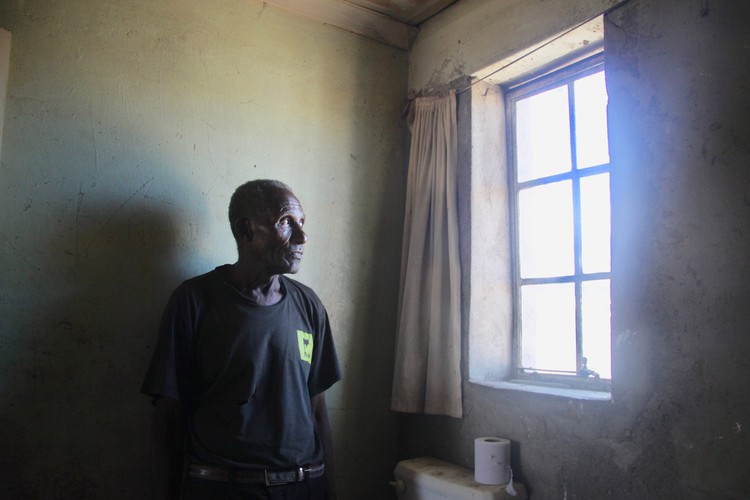
Wellington Zweni, who is 81, standing in the bathroom of his unit in Block C hostel in Mbekweni, Paarl. Photo: Sabelo Mpana
24 March 2017
In Mbekweni, Paarl, more than 200 families still live in hostels originally built and designed to house workers during apartheid. For over 20 years, they have been waiting for the hostels to be converted into family units.
The buildings were already in poor condition when they were handed over to families – blocks A and D in the 1980s, and blocks B and C in the early 1990s.
Some families managed to renovate and convert the units at their own expense. Others are living in the same conditions they first found or even worse.
Wellington Zweni is 81. He has been living in Block C since 1983. At first he stayed with 23 other men, until the unit was handed over to him in 1996.
“When they [the units] were given to us, they were in bad condition. We had to fix them ourselves,” says Zweni.
“My wife left me, but I do not want to talk about that part of my life, and my son is not staying with me. I am staying alone here. I survive from old age money and my van [which he rents out] is making me some income to live from.”
Under apartheid, 12 men lived on each side of an open room, with one front and one back door. Each block shared communal toilets and a kitchen. The kitchens are now used as churches and one is a pre-school. The toilets were demolished at the time of the handover.
“I managed to do some renovations in my house by using the plan which the municipality promised to build for us … but the house is not complete,” says Zweni.
What Zweni and others want is for the municipality “to fulfill their promise” of turning the hostels into family units.
“The only thing that was done in our houses is half-built toilets, which I had to pay someone to finish,” he says.
Nomathamsanqa Mphephetho, who is 69, says, “We are 17 all together in the house. Some of the kids have shacks at the back … When I moved into this hostel, there was no window glass or doors. Everything you see, I fixed on my own.”
Families who paid for their own renovations expect to be recompensed by the municipality. All families have paid for the maintenance of the hostels themselves.
Resident Partick Nofemele has tried to get reimbursed, but says he has been sent from pillar to post. He has minutes of meetings showing interactions with the municipality dating back to the late 1990s.
“We have been in every office where we think we could be helped. Recently, we went to the Legal Aid offices as well as the Public Protector’s office … [where] we were referred to the [municipality’s] ombudsman’s offices,” says Nofemele.
Drakenstein municipal manager Johan Leibbrandt says blocks A and D were transferred to Drakenstein when the Mbekweni Town Council was dissolved. Residents upgraded the housing into family units at their own expense, but without pre-approval by council. Some residents took transfer of the properties, others refused because they wanted to be compensated for the upgrades.
According to Leibbrandt: “At the last engagement between the parties, the Municipality requested the aggrieved parties to present evidence on the cost incurred. The information received is currently being reviewed and will form the basis of making an informed decision. A final outcome is expected by the end of the financial year, 30 June 2017.”
Siyabulela Mandyoli, secretary for the A and D residents’ committee, said, “The last meeting we had with the municipality was in August last year … When we spoke about how much we expect to be compensated with, we had to look at the price of our plan back in 1989, which was R15,000 [per owner].
“The amount will have interest of 6% per year from 1989 till to date, although the first group of people got their houses in 1985 in A and D Blocks.”
Mandyoli said, “I have already sent the invoice. We are still waiting for the municipality to get back to us … We had an agreement with the municipality that we will not be paying rates until this issue is resolved. In this year if the municipality can finalise this, we are more than [happy] to start paying rates and we expect our title deeds.”